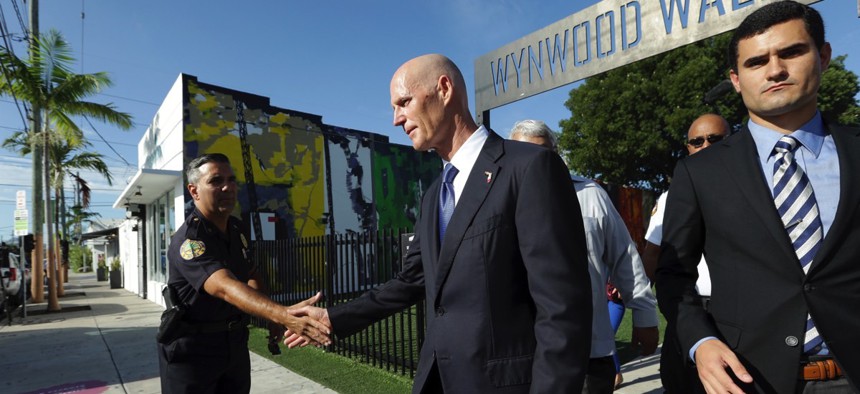Florida's Zika Image Problem

Florida Gov. Rick Scott after a news conference in Wynwood on Monday, Sept. 19, 2016. (AP Photo / Lynne Sladky)
Governor Rick Scott declared victory over the virus in a small Miami neighborhood and businesses rejoiced—but nearby, two people had recently become infected.
Florida’s Governor Rick Scott stood beside local business owners earlier this week and declared triumph in Wynwood. The small neighborhood north of Miami had been the first place in the continental United States where mosquito-borne Zika was spread, and the Centers for Disease Control and Prevention had told people to stay away.
To the great relief of local businesses, Scott said on Monday that “everybody should be coming back here and enjoying themselves,” as he stood in front of the type of artsy building mural Wynwood is known for.
Federal officials have spent the summer spraying and fumigating to try to rid the area of Aedes aegypti, the mosquito that carries Zika, since the virus first appeared there in July. This week, Wynwood met the CDC’s requirement for being declared Zika free: no new cases reported for 45 days. But the CDC took a much more cautious tone than Scott did. Director Tom Frieden said Monday while there have been great strides made in spraying and killing Zika-carrying mosquitoes, “we encourage people not to let down their guard.” “We could see additional cases,” he warned.
That is not what the Miami area wanted to hear.
After health officials found Zika in Wynwood, sales in the area slumped 50 percent . Business owners pressured Scott to do something about the trendy arts neighborhood’s new stigma. They complained that maps with an giant box that labeled much of Wynwood a Zika “hot zone” were over the top. Locals griped that the media had overhyped the seriousness of Zika. Then in August, local transmission of Zika was reported in Miami Beach. Zika had spread to the white-sand beaches, restaurants, and clubs of one of southern Florida’s most popular tourist spots. In August, airfare prices to Miami International Airport and Fort Lauderdale-Hollywood International Airport fell 17 percent. The damage had been done. Half of Americans feared traveling to areas with Zika, which included Miami.
That’s why Scott’s announcement Monday had the jovial trappings of a ribbon-cutting, instead of the CDC’s more cautious—and realistic—message that warned pregnant women and their partners should still postpone nonessential travel to all Miami-Dade County. In fact, most of the CDC’s travel advisories for Florida remain unchanged, because although Zika left Wynwood, it hasn’t left the Miami area.
As Scott announced victory over Zika in Wynwood, 20 minutes to the east, in Miami Beach, a new case of Zika infection was reported. In that city, five different batches of mosquitoes with Zika were found, presumably in different places. State health officials officials identified only one of those spots, the Miami Beach Botanical Garden, days after the garden closed for mosquito-related reasons, the Miami Herald reported. The Herald filed a lawsuit Friday demanding Miami-Dade County reveal where it found Zika-infected mosquitos, arguing that the public has the right to know, because “the precautions, decisions, and risk facing someone living or working next door to these specific locations are different than those facing someone who lives miles away—especially since this species of mosquito typically travels no more than 1,000 feet during its life cycle.”
But local business and city officials might list the same reasons as their desire to keep the information quiet. If Zika-infected mosquitos have been identified near a popular hotel, restaurant, or tourist attraction, the public would know the area within a 1,000-foot radius is a Zika zone—and they’d likely stay far away.
Florida officials have tried to balance informing the public, fighting Zika, and luring tourists. In Miami Beach, officials conducted an aggressive aerial pesticide campaign, despite some residents’ protests that the active chemical used in the spray has been banned in the European Union because of its questionable health concerns. In Wynwood, when Zika fears threatened to hinder tourism around Memorial Day, the mayor of Miami announced the arts district would provide free two-hour parking.
J. Weston Phippen is a senior associate editor at The Atlantic, where this article was originally published.
NEXT STORY: San José Moves Forward on Free Broadband for Underserved School Families





